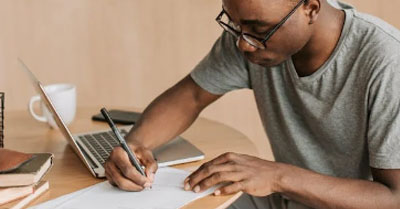Course Navigation
Reading Is More than Reading Words on a Page
Many readers think that reading starts when you read the first paragraph. However, in-depth reading takes more than just reading the words on the page.

Tima Miroshnichenko | Pexels
What Happens Before Reading
From the moment you get your hands on some reading material, you start making connections and processing information.
Perhaps you guess what the topic will be based on the title, or perhaps you recognize the author, so you know what to expect.

Andrea Piacquadio | Pexels
You can (and should) also use pre-reading techniques and skim the text so you gain some insight into what you are about to read. By familiarizing yourself with the text, you make yourself ready to learn the information and improve your reading comprehension.
Going beyond the text before you start reading
As you flip through the pages before you start reading, you may be curious about something. You can quickly search for more information on the Internet. Skimming those extra sources will make you even more ready to learn the content, which will ultimately improve your reading comprehension further.
What Happens During Reading
When you start reading, apply all the reading techniques you know.
As an English-language learner, you may be concerned about vocabulary you do not understand. Focus on learning the content rather than looking words up that are unimportant or whose meaning you can figure out from the context.

Vlada Karpovich | Pexels
Focus on understanding each paragraph by going through the main ideas the writer wants you to understand and how the writer supports those ideas. Use good study skills and take good notes, outline what you read, and summarize and synthesize the information.
Read carefully by interpreting the information and reading critically the information the writer presents.
Going beyond the text while reading
Search additional information in outside sources. You can search the internet or go to a library to find more materials on the topic. If there is something you do not quite understand, search for information outside the text.
If the topic interests you or if it is important for you to understand it very well, read about it in other sources.
What Happens After Reading
Learning should not stop when you read the last paragraph. For example, perhaps the text did not cover something you are curious about, so search for additional information on the topic.
If you are a student, review your notes, and summarize the information.

THIS IS ZUN | Pexels
Read other sources that may have additional information on the topic. Read texts by other writers, who may have different insights.
Sometimes reading and learning can be solitary activities. Make them social. Discuss what you read with others. If you are a student, when you go to class ask questions about what you read and offer your own perspectives. (You can write questions when you take notes during reading.)
Final Words
Reading is a very complex activity. Children acquire speech naturally simply by being exposed to languages. Reading, however, is an artificial activity we must learn. We must practice it to get better and better at it, too.
Reading critically is also a skill you must develop over time. The more you interpret, analyze, and evaluate the information when you read, the better at it you become.
Having background knowledge of the topic also makes it easier to understand what you read. That is why you should read as often as possible. Read from different authors and sources, and read in different topics.
As an English-language learner, you are faced with an even more complex task. You must read in a language that you are still learning. Again, the more you practice reading, writing, listening, and speaking, the easier it gets to understand ideas in the language. The more you learn about the English-speaking culture and how people express ideas in English, the easier it gets to understand what you read and listen to.
(Check out this lesson on extensive reading, which is something you can do whether or not you are taking a course in English.)
It takes time. The best time to start on that long journey is now.
You’re all done. Congratulations on completing everything!

Thanks to our supporters!
This material has been made possible by supporters like you. Learn how you can support us.

“What should I learn next?”
Check out the lesson on extensive reading or use the navigation buttons to choose another skill or another lesson in this skill.
woosh..... ─=≡Σ((( つ◕ل͜◕)つ
Thank you for Supporting Snap Language
Snap Language supporters make the creation of these materials possible.
Learn how you can support our work, get perks, and help us continue creating high-quality materials.
You can support us by simply white-listing this site.